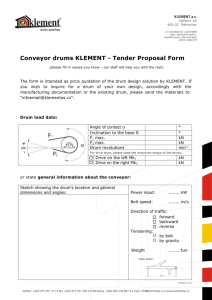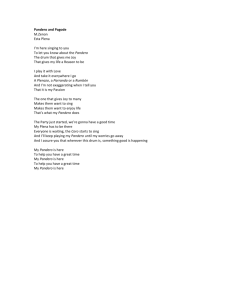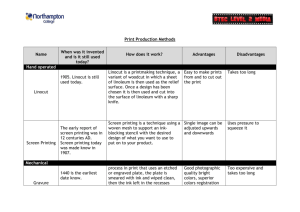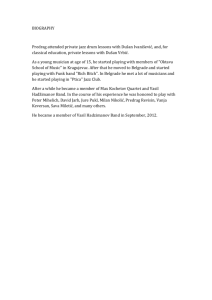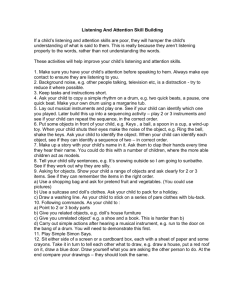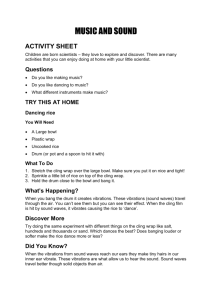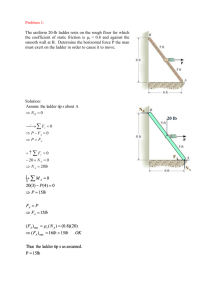Lafaek has a Party
advertisement
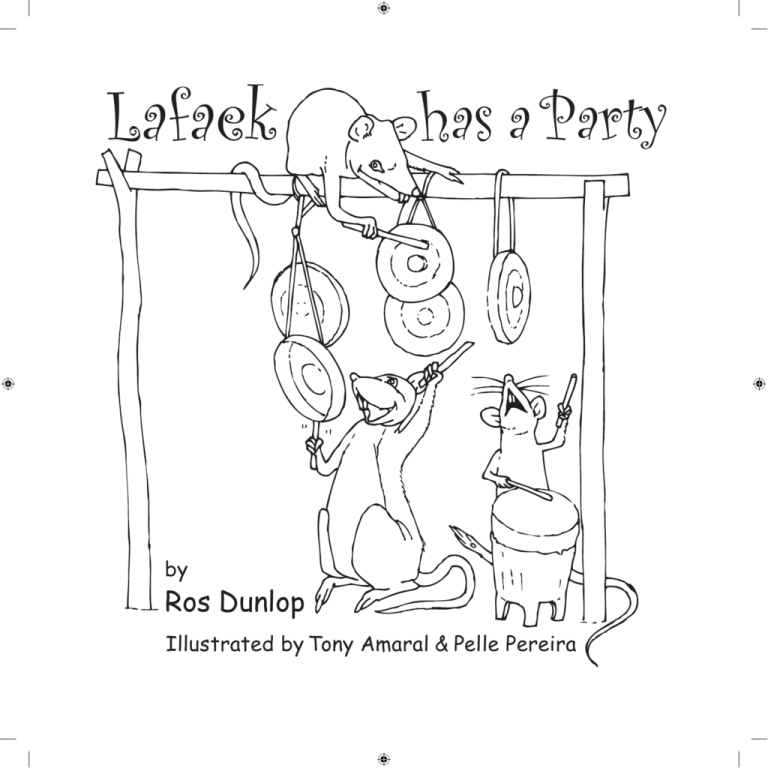
Lafaek has a Party by Ros Dunlop Illustrated by Tony Amaral & Pelle Pereira Did you know this baba dook was once a goat? Lafaek is the chief of his village. He is having a party! He is inviting all the animals to come with their instruments. It is a party for Liurai Loriku, who is visiting his village for the first time. baba dook! We make a big sound on our tala! The Fahi twins are going to Lafaeks’ party with their tala! tala! Is my tihak loud enough? Lenuk plays his tihak to help Lafaek call the animals to the party. tihak! Can you play rama ? Bibi-Rusa is playing the rama. He hears Lenuk’s tihak so he follows the beat all the way to Lafaek’s party! rama! We love to play sene. The Laho sisters are going to Lafaek’s party. They like to play the sene very loudly! sene! Ke’e is a drum with four legs. Toke always plays with the Laho sisters, so he is going too. ke’e! I love dancing with bano! Kuda loves to dance. Her ankle bells are called bano and they jingle and make lovely sounds when she dances. She wouldn’t miss Lafaek’s party! bano! I love singing and playing bijol meto. Karau-Timur is sitting on a rock playing the bijol meto when his friends the Laho sisters. Kuda and Toke ask him to come with them to Lafaek’s party. bijol meto! I like playing au. Karau is taking her au with her to Lafaek’s party. au! Did you know tohin means to play loud? Bibi is strong and plays tohin very loudly. He is going to Lafaek’s party! tohin! Blow don’t suck karau dikur! Samea heard Bibi beating the tohin and blew an answer on his karau dikur. He likes playing karau dikur when Bibi plays tohin. So Samea is going to Lafaek’s party too! karau dikur! I can play two notes on my kafu’i! Makikit heard Bibi’s tohin and Samea’s karau dikur. Makikit plays the kafu’i and loves a party so of course he is going! kafu’i! We play the lakadou together. The Possum twins always play the lakadou together. They play for parties a lot, so they are going to Lafaek’s party too. lakadou! You’re not blowing hard enough! That butterfly better watch out or I will blow it right off my kokotere! Lafaek knows Asu is the best kokotere player in Timor so he has invited Asu to play at his party as well. kokotere! ...and it is a rare instrument. We play the... ailoos! The Busa sisters play a funky beat on their ailoos. Just the right music for a party and they are going too. ailoos! I love playing raraun! Me too! The Lekirauk twins play the raraun and sing for special dances. Everyone likes dancing so they are going to play at Lafaek’s party. raraun! Come on chicks we must practice our kakeit! My string is stuck! I am trying Mama! Mother Manu and her chicks play kakeits. Farmers sometimes ask them to play their kakeits to scare the beetles away when they eat the corn. Today they are going to play their kakeits at Lafaek’s party. kakeit! We only play the bobakasa on this side. Sapu and Manduku are cousins, they love playing the bobakasa. It is a very special instrument so Lafaek asked them to play at his party. Of course they said yes! bobakasa! I can blow my fiku loudly and scare the pigs! Bee-Na’in loves playing fiku! She plays it to scare the pigs away who try to eat her father’s corn. Lafaek asked Bee-Na’in to help him scare the pigs away who are trying to eat the corn for his friends to eat at his party. fiku! I just scared a pig by playing my kakalo! Kadiuk is playing his kakalo, he is good at scaring pigs too, so he is going to help Bee-Na’in scare the pigs who are trying to eat the corn for Lafaek’s friends to eat at his party. kakalo! Do you think we are playing our kakal’uta loud enough? The Niki twins play kakal’uta. They are good at scaring animals away so Lafaek asked if they could help Kadiuk and Bee Na’in scare the pigs away. kakal’uta! karau tihak! dikur! rama! bano! karau dikur! tala! bijol meto! baba dook! At last the animals are at Lafaek’s village with their instruments. Everyone is playing music and it is very loud! Liurai Loriku comes and he can’t believe his eyes. There are so many different instruments. All the animals and Liurai Loriku play, sing and dance. The party goes all day and all night! “THANK YOU SO MUCH!” says Liurai Loriku. I feel special! I didn’t know we had so many traditional musical instruments in East Timor. We are very lucky!” Information about the Instruments Baba dook The baba dook is a hand held drum. It is played for the tebedai. Tebedai means ‘following dance.’ The skin of the baba dook can be made from a goat. Sometimes it is bat wing or the kidney of a buffalo. Tala A tala is a gong and is made of metal. It is held by the handle to make a good sound. Tala is hit three times to start the tebedai. Tihak The tihak is a big drum and you must sit down and lie it across your legs to play. Only men are allowed to play the tihak. It is only found on Ataúru. Rama (rama-inan) A rama is a mouth bow. Originally it was a hunting bow. To play it put one end of the rama against your mouth and change your mouth shape as you strike the string with a small stick. It makes many sounds. Sometimes it is played for tebedai. Sene Sene is baikeno for gong. Baikeno is the language spoken in Oekusi. When the sene are hit you say “leku sene!” Sene is played with the Ke’e drum and they must all play in strict time. They play for the dance from Oekusi called the bsoot. Ke’e The ke’e is the only drum in East Timor with four legs. It is from Oekusi. It is played with the sene for the bsoot. It is played in relay because it takes lots of strength to play it. Bano Bano are ankle bells believed to have come from China. They were originally made of brass, now they are usually made from aluminium. They are worn to dance the bsoot. Bijol meto The bijol meto is a ukelele and is carved out of one piece of wood. Its strings are made of fishing line. Au An au is made of two bamboo tubes. They fit inside each other and you have to blow hard to make a sound. It plays two notes. Tohin The tohin is a lulik drum played for important occasions and comes from the mountain villages of East Timor. Lulik means sacred or spiritual. The tohin drum skin is made of buffalo. Tohin means; “play very loud.” It takes a lot of energy to play, so people take it in turns. Karau dikur Karau dikur is made from a real buffalo’s horn. It is a lulik instrument like the tohin. Karau dikur is used to welcome special guests. Kafu’i Kafu’i means flute. It is used by farmers to call the buffalo. Some kafu’i are made of wood and have no finger holes, these ones can only play two notes. Kafu’i can also be made of bamboo and have many finger holes so they can make more notes. Lakadou A lakadou is a bamboo tube zither and the strings are also bamboo. It can have from 7 to 24 strings on it. Bamboo blocks called bridges placed under the strings are moved to tune it.A hole at the back helps make the sound bigger. Kokotere The kokotere has a long straight bamboo tube. The bell is made of a wound palm leaf. It is played to welcome people and for parties. A special palm tongue is fixed into the mouthpiece of the kokotere and you suck it up and then blow it down hard to make the sound which sounds a bit like growling. Ailoos Ailoos is a rare instrument, it is called a leg xylophone, because the wooden bars lie across your legs. A xylophone is a wooden instrument with different length wooden bars played with wooden beaters. Each bar makes a different sound. Ailoos is played for the dance bidu ailoos. Raraun A raraun is played like a guitar. It is made from one piece of wood. The strings are made of fishing line. It is played for the dances of Kovalima, bidu tais mutin and bidu makikit. Tais is the traditional cloth of Timor. Kakeit Kakeit is a jaw harp and is made of bamboo or metal. Sometimes farmers play kakeit to scare the beetles away from eating the corn. The kakeit is put against your mouth to make a sound. Different sounds are made when you change the shape of your mouth.This is the story of how the first kakeit was made. A little boy was an orphan. One day he was blowing through 2 bits of old tin to make music. He decided to make an instrument so he always had something play. When he finished making his kakeit he took it to the market to play. People liked his playing and asked him to make more kakeits. Sometimes people play the kakeit to honour their ancestors or to ask for their blessing! Bobakasa Bobakasa is a very special drum. It has two sides.The skin of the bobakasa is goat. You have to stand up to play the bobakasa, it is held in place with a strap which goes over your shoulder and beaten with drum sticks on one side only. Sometimes people make promises in the name of the bobakasa. The drum sticks are called bobakasa girte - a Makasae word. Fiku Fiku is a palm trumpet and is made from a tightly wound palm leaf, it is played to scare animals especially pigs away from eating crops. There are different sized fiku. It can also be called pai koe-koe these are Fataluku names. Fataluku is the language spoken in the Lautein district. Kakalo Kakalo is a bamboo slit drum. A slit drum has a cut right down the middle of the drum, this makes the sound big when it is hit. The kakalo is flat on one side and a slit is cut into the centre of the flat side. The kakalo is played to help scare pigs away from eating the farmer’s corn. Kakal’uta The kakal’ uta is a log xylophone. Each player has three logs to play. The kakal’uta is made from the wood of the pokura tree found in the jungle in the Lautein district.Farmers used to play it to scare the animals and birds away from the crops. This book may be reproduced for educational purposes. Design by Penelope Lee for TEKEE MEDIA 2012
